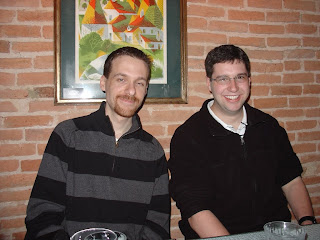 I know I'm jumping the gun a bit here, it's not even Christmas yet! But, I'm currently only writing homilies for Sunday readings. Below is my homily for next Sunday's readings on the Feast of the Holy Family.
I know I'm jumping the gun a bit here, it's not even Christmas yet! But, I'm currently only writing homilies for Sunday readings. Below is my homily for next Sunday's readings on the Feast of the Holy Family.For the past few weeks, we have been so intensely focused on the coming of Jesus Christ, that today the Church invites us to take a step back and look at a larger picture: The Holy Family. The Son of God, in His Divinity, could have come to us full grown and alone. Or he could have come as a child under the protection of some royal court. Instead, he chose to come to us in the midst of the most fundamental dynamic in human life: the family. The first thing Jesus sanctified by his presence was a family home – the poor cave Mary prepared for Joseph and their newborn Son. The first instrument he uses to draw men to himself is the family. Notice how this Holy Family immediately attracted the wise men and the shepherds to come and adore the Infant Jesus, because Jesus was at the center of their life. In this way the Holy Family is the greatest example we have ever been given for how our own families should be formed: centered on Jesus. Does the joint witness and holiness of our family draw others to us and therefore to Christ? Is He the center of our family life? A little examination of conscience for our family as a whole is important for us to do today as we reflect on the Holy Family.
But, what should we think when we notice that not much is said of the Holy Family at all in Scripture? In fact, the Bible is silent about Jesus’ entire adolescence and early adulthood, attributes no words and very few scenes to St. Joseph, and not much more to the Blessed Mother. Should we just think then that the Holy Family is too good to be true? Too good to be a feasible example for us to follow? If we thought this way, I’m afraid we would miss the whole point. It is true that Mary is the greatest of all creatures, without sin and ever-virgin. And Joseph was a “just man” and the protector and foster-father of the Son of God. And Jesus was both fully divine and fully human! So this isn’t your typical family! But, by showing their poor means, their long journeys, their devotion, and their many years in obscurity, Luke highlights the ordinariness of this family despite its extraordinary members. This is a family we can and should see ourselves in. This is a family we can and should relate too.
In reality, most of our families are in relative obscurity. We don’t make the front page very often or have our own reality show. None of our relatives are Hollywood celebrities or musicians. Our families work hard, try to make a living, pray together, raise their kids well, and try to do the best they can. Our families are most like the Holy Family when they are humble and simple like this. But, today’s celebration of the Holy Family calls us to continual conversion.
First, to all the children here this morning: Are you like Jesus was when he was a child? Do you remember what our Gospel said about him? It said he “grew and became strong, filled with wisdom; and the favor of God was upon him.” Are you doing what you can to stay healthy and strong? Are you eating good foods and avoiding too many snacks and sweets? Do you play outside and exercise or do you spend hours playing video games? Do you listen to your parents and remember their advice and learn from them? Are you putting your best effort into your homework and reading books to develop your mind? Most importantly, do you pay attention at Mass, talk to God often, and pray with your brothers and sisters? If you can do your best in these things then you can be like the child Jesus in the Holy Family.
To the Mothers and Fathers here this morning I’d like to share a story from my own childhood. One of my fondest memories is of my Dad teaching my three brothers and me how to pray each night before we went to sleep. My dad was a manager at McDonald’s for most of my childhood and so he often worked long hours and late nights. But I remember well how he would come home late and instead of finding us fast asleep, my brothers and I would be wide awake laughing and teasing each other. So he would gather all of us in one of our bedrooms and we’d all pile onto one bed. He would have us take three deep breaths to calm down and then he would take a little prayer card out of his shirt pocket. He would say a line of the prayer and we would say it after him until we memorized the whole prayer. Soon we learned several prayers and formed a regimen of prayers that I still say to this day.
Since I started to take my faith more seriously, back in my senior year in college, I began to look back on memories like this and treasure them greatly. But I used to always wonder why my mom had never been a part of it. I used to regret not having my mom there with us. I asked my dad about this one time a few years ago and then I learned the truth. My dad would come home dog-tired after 12 hours or more at McDonald’s and all he would feel like doing is kicking his feet up for a while. But my mother would always encourage him night after night to go into our rooms and pray with us. She was a Catholic elementary school teacher so she did much to teach us the faith. But on those precious evenings she worked behind the scenes as the gentle inspiration my dad needed to be the spiritual leader of our family.
I share this story with you not to imply that I had the perfect family, we had our own spiritual and worldly shortcomings. My point was to convince you not to take for granted your role as spiritual mothers and fathers of our Catholic faith. Our children have a natural capacity for awe and wonder and mystery. Their innocent souls are uninhibited fonts of faith, hope, and love. As a spiritual father myself I implore us all to work together in our families to cultivate and nurture the budding Catholicism of our children. They are looking to us to validate and share the faith that they are being taught so well in our school. On one hand I see many parents who are doing a great job of this, they encourage their children to participate at Mass or even to serve it; they involve their children in the life of the parish; and they devote much time and effort to their spiritual development. Most of our families do this.
But we also know relatives in this parish or in our extended family for whom we are concerned. For example, what message do we send our children when we teach them how to pray at school but then refuse to pray with them at home? Or when we teach them to say the rosary at but then forget to pray it together as a family? Or worst of all, when we prepare them for their First Confession and their First Communion but then never go to Confession ourselves or fail to bring them to Confession or even to Mass on Sundays? The once a week school Mass is not enough. Our children are open vessels; when they experience the graces of our faith they want it all. Let’s not give them mixed signals. Let’s not ensnare them in our own personal lukewarmness, if that is our struggle. Vatican II taught us that the home is a domestic church and parents by their words and actions are the first heralds of the faith. Let’s embrace this responsibility with all our hearts, with generosity and with joy. We can become a barrier to our own salvation and that of our children or we can make the narrow path accessible to them and easy to find. On this feast of the Holy Family, let us remember the words of St. Francis de Sales, a Doctor of the Church: “Raising a house, that is, a family, does not consist in building a splendid residence and storing up vast worldly possessions but in training children well in the fear of God and in virtue. No trouble or labor should be spared to do this, for children are their father’s and mother’s crown” (Introduction to the Devout Life)























